FAQ
What is ZK-Proof of Work?
Nockchain uses ZK-Proof of Work as its consensus mechanism for providing trustless settlement and ordering guarantees. ZK-Proof of Work is similar to Hashing-Proof of Work in that miners compete to try to run a puzzle computation repeatedly with different nonces until the hash of the output is less than a targeted number, colloquially referred to as the difficulty. In our initial implementation of ZK-Proof of Work, miners create a Zero-Knowledge Proof (ZKP) of a fixed puzzle computation and then hash the ZKP.
Nockchain's parameters are similar to that of Nakamoto Consensus, with a 10 minute block time target, difficulty retargeting every 2 weeks, and an initial block size of 1MB.
Where do I go to download the Nockchain open-source mining code?

What is Dumbnet?
Dumbnet is the first version of the Nockchain mainnet. It's rather minimal and only has features for simple spends of UTXOs, multisigs, and timelocks.
How do you define fair launch?
We define a fair-launch as a Proof-of-Work competition in which there is no pre-mine, and everyone can verify that mining started at a known time.
What are recommended mining specifications?
We recommend a machine with at least 64GB of RAM, 200GB of available disk space, and a fast CPU. Mac Minis might be a good option as they have unified memory and STARK computation is often memory-intensive.
Is Nockchain mining primarily CPU or GPU?
At Dumbnet launch, we are releasing a CPU-mining reference client. We make no guarantees as to its behavior. We expect, but cannot guarantee, that it will take time for developers to port this to GPU, as STARK optimization is rather difficult. It is a matter of contention among researchers whether GPUs or FPGAs will be more efficient for STARK proving long-term.
What is Zorp's relationship to Nockchain?
Zorp is a for-profit labs company that does engineering and R&D focused around the Nock ecosystem. Zorp developed the Nockchain protocol.

